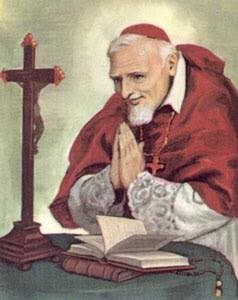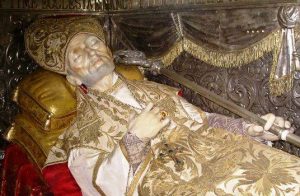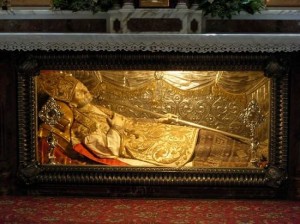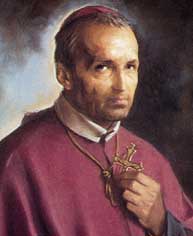 Today, the Church honors the memory of Saint Alphonsus Liguori. The particular clarity of our Pontiff emeritus Benedict XVI gives a brief primer on the saint; he draws us to the essential. Let’s consider what he says.
Today, the Church honors the memory of Saint Alphonsus Liguori. The particular clarity of our Pontiff emeritus Benedict XVI gives a brief primer on the saint; he draws us to the essential. Let’s consider what he says.
In his day, there was a very strict and widespread interpretation of moral life because of the Jansenist mentality which, instead of fostering trust and hope in God’s mercy, fomented fear and presented a grim and severe face of God, very remote from the face revealed to us by Jesus. Especially in his main work entitled Moral Theology, St Alphonsus proposed a balanced and convincing synthesis of the requirements of God’s law, engraved on our hearts, fully revealed by Christ and interpreted authoritatively by the Church, and of the dynamics of the conscience and of human freedom, which precisely in adherence to truth and goodness permit the person’s development and fulfilment.
Alphonsus recommended to pastors of souls and confessors that they be faithful to the Catholic moral doctrine, assuming at the same time a charitable, understanding and gentle attitude so that penitents might feel accompanied, supported and encouraged on their journey of faith and of Christian life.
St Alphonsus never tired of repeating that priests are a visible sign of the infinite mercy of God who forgives and enlightens the mind and heart of the sinner so that he may convert and change his life. In our epoch, in which there are clear signs of the loss of the moral conscience and — it must be recognized — of a certain lack of esteem for the sacrament of Confession, St Alphonsus’ teaching is still very timely.
Together with theological works, St Alphonsus wrote many other works, destined for the religious formation of the people. His style is simple and pleasing. Read and translated into many languages, the works of St Alphonsus have contributed to molding the popular spirituality of the last two centuries. Some of the texts can be read with profit today too, such as The Eternal Maxims, the Glories of Mary, The Practice of Loving Jesus Christ, which latter work is the synthesis of his thought and his masterpiece.
He stressed the need for prayer, which enables one to open oneself to divine Grace in order to do God’s will every day and to obtain one’s own sanctification. With regard to prayer he writes: “God does not deny anyone the grace of prayer, with which one obtains help to overcome every form of concupiscence and every temptation. And I say, and I will always repeat as long as I live, that the whole of our salvation lies in prayer”. Hence his famous axiom: “He who prays is saved” (Del gran mezzo della preghiera e opuscoli affini. Opere ascetiche II, Rome 1962, p. 171).
In this regard, an exhortation of my Predecessor, the Venerable Servant of God John Paul II comes to mind. “our Christian communities must become genuine ‘schools’ of prayer…. It is therefore essential that education in prayer should become in some way a key-point of all pastoral planning” (Apostolic Letter Novo Millennio Ineunte, nn. 33, 34).
Among the forms of prayer fervently recommended by St Alphonsus, stands out the visit to the Blessed Sacrament, or as we would call it today, “adoration”, brief or extended, personal or as a community, before the Eucharist. “Certainly”, St Alphonsus writes, “amongst all devotions, after that of receiving the sacraments, that of adoring Jesus in the Blessed Sacrament takes the first place, is the most pleasing to God, and the most useful to ourselves…. Oh, what a beautiful delight to be before an altar with faith… to represent our wants to him, as a friend does to a friend in whom he places all his trust” (Visits to the Most Blessed Sacrament and to the Blessed Virgin Mary for Each Day of the Month. Introduction).
Alphonsian spirituality is in fact eminently Christological, centred on Christ and on his Gospel. Meditation on the mystery of the Incarnation and on the Lord’s Passion were often the subject of St Alphonsus’ preaching. In these events, in fact, Redemption is offered to all human beings “in abundance”. And precisely because it is Christological, Alphonsian piety is also exquisitely Marian. Deeply devoted to Mary he illustrates her role in the history of salvation: an associate in the Redemption and Mediatrix of grace, Mother, Advocate and Queen.
In addition, St Alphonsus states that devotion to Mary will be of great comfort to us at the moment of our death. He was convinced that meditation on our eternal destiny, on our call to participate for ever in the beatitude of God, as well as on the tragic possibility of damnation, contributes to living with serenity and dedication and to facing the reality of death, ever preserving full trust in God’s goodness.
 Saint Alphonsus de Ligouri, founder of the Redemptorists, great writer and Doctor of the Church (declared by Pius IX); patron of moral theologians.
Saint Alphonsus de Ligouri, founder of the Redemptorists, great writer and Doctor of the Church (declared by Pius IX); patron of moral theologians.


